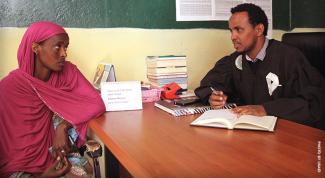OVERVIEW
Ethiopia’s reform agenda, introduced in 2018, paved the way for optimism that the country was on a path to participatory and democratic governance through such notable first steps as the release of political prisoners, liberalization of laws governing media and civil society, and promising efforts to heal long-held grievances and ethnic divisions. However, multifaceted crises soon emerged including a war in the north, burgeoning instability in several areas of the country, increased political tensions as regions vied for more influence and autonomy, and renewed inter-ethnic conflict.
In response to these opportunities and challenges, USAID has prioritized assisting Ethiopia to further increase democratic space and an engaged citizenry, improve human rights and rule of law, and support government transparency and accountability. We stress that well-functioning governance structures, trusted institutions, and an open political system with a robust role for civil society can only serve to strengthen the country’s stability. Our support builds the capacity of the Ethiopian judicial system to better serve citizens, ensure justice, and strengthen the rule of law. Through engagement with communities on conflict resolution and dialogue, our work seeks to ensure that local actors are better equipped to advocate for their rights and build consensus in their communities to peacefully resolve differences. Ethiopia’s transition to a stable multi-party and participatory democracy remains a long-term U.S. foreign policy objective and a focus of our engagement.
PRIORITIES
The USAID Feteh (Justice) Activity supports the Ethiopian legal and justice reform process by providing assistance to selected rule of law institutions, including the Ministry of Justice and Regional Justice Bureaus, federal and regional Supreme Courts, and human rights organizations such as the Ethiopian Human Rights Commission (EHRC), and the public defender’s office. Through this activity, USAID also supports civic organizations, the media, and legal and academic institutions to meaningfully participate in legal and judicial reforms. USAID assistance has supported the drafting of several laws including those that open the space for civil society to operate more freely and has provided free legal aid to more than 3,000 individuals and produced more than 250 radio and television programs on rights and justice issues such as women’s rights and gender-based violence. Feteh has also assisted the EHRC to develop a rapid response mechanism for victims of human rights violations.
The Ethiopia Elections and Political Processes Program helps strengthen the capacity of foundational democratic institutions such as civil society, political parties, media, and electoral bodies to create a more transparent, participatory, and accountable democracy in Ethiopia with a focus on women, youth, and other traditionally marginalized groups. The program extends the reach of the Ethiopian media to educate the public about key political processes, while ensuring greater transparency and promoting more meaningful participation. USAID and its partners also strengthen the capacity of Ethiopian civil society organizations (CSO) and political parties to represent the needs of all Ethiopians more effectively, including facilitating dialogue at regional and community levels. This work builds on previous efforts in the lead-up to the 2021 national elections in Ethiopia during which USAID provided assistance to CSOs for voter education and nonpartisan observation; aided political parties to develop codes of conduct and facilitated multi-party debates; and supported the National Election Board of Ethiopia (NEBE) to organize, administer, and conduct free and fair elections.
Office of Transition Initiatives (OTI), USAID supports a peaceful and inclusive reform process that provides a pathway to a more democratic Ethiopia. USAID/OTI prioritizes flexibility to changes in Ethiopia and programmatic objectives evolve accordingly. OTI is working to strengthen relationships and actions between Amhara and Oromo groups; advance constructive public discourse on issues like Ethiopia’s federal structure, and mitigate misinformation and hate speech by producing fact-checked content on university campus radios and social media platforms.
Through support from USAID’s Global Reconciliation Fund,the Borena Cross-boundary Initiative for Peace Activity aims to improve community-level resilience to conflict through strategic interventions that promote reconciliation and enhance intergroup collaboration for conflict mitigation and peacebuilding in the Borena Zone of Oromia region.
The Cross-boundary Initiative for Peace Activity seeks to bring Oromo and Somali ethnic groups together to interact and engage constructively in safe spaces to break down social and cultural barriers and promote peaceful coexistence in border areas of the regions through support from USAID’s Global Reconciliation Fund.

